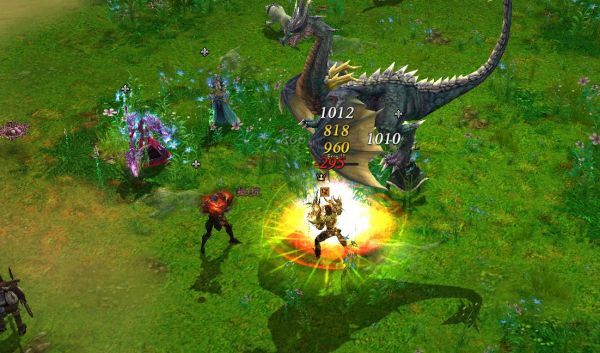The MMO world is going through a lot of changes, some obvious, like the emergence of more World of Warcraft-type clones, some not so obvious, like the popularity of free-to-play MMOs. While we don’t tend to cover MMOs here on Co-Optimus, it’s hard for us to deny that many of them include co-op elements as a core part of their gameplay experience. When we were at PAX East, we had the opportunity to speak with Sam Houston, a representative from Perfect World Entertainment Inc., about the free-to-play style of MMOs, how China fits into the picture, some of the projects Perfect World Entertainment has lined up for the future, and why they decided to help Runic publish Torchlight.
Co-Optimus: So you work for Perfect World Entertainment that makes a Perfect World?
Sam: Our company is called Perfect World Entertainment and we have a game called Perfect World International, so that’s how that works. We try to make perfect worlds if you want to get really cheesy, I don’t know. [laughs] We make MMOs and we’re a wholly owned subsidiary of a Chinese company that’s called Perfect World and they’re one of the big MMO publishers and developers in China. It’s actually a trend you're going to see a lot more of… that a lot of these Chinese companies are trying to bring the free-to-play business model to the Western market. [Perfect World Entertainment] has been around for about two years now and to-date we’ve just been a publisher, so we take our games from China, that’s been developed by Perfect World in China, and localize them.
Co-Optimus: What does that entail?
Sam: So not only do we take the text out and [translate from Chinese to English], but we also change the way the cash operates, which is really important, as well as some of the gameplay. The way people play these games in China is a method we call “pay-to-win,” which is essentially “You want a sword? Pay me a bunch of money for it!” Players in North America really aren’t cool with that… So the way cash operates in our game is that it’s convenience based. Like say you don’t have a lot of time but you’ve got money, then you could buy something that helps you level up faster. We’re not subscription-based, we’re item-shop based, which includes things like different outfits for your characters or different mounts that you can ride. So that’s how we earn money. What’s neat about that, I think, is that there’s no financial commitment. When you’re playing World of Warcraft, you [feel like you] want to get your $15 every month. For us, you can play whatever you want to play; if you want to play our WoW and our game at the same time, then be our guest, that’s fine. Both sets of players, the free-to-play and those that pay for items, are equally important to us. They both co-exist and we like both in our worlds.

Face off against dragons, convicts, and the Scorpion King (no word if it's The Rock version) in Battle of the Immortals
Co-Optimus: You have a few titles out already, such as Perfect World, Jade Dynasty, and Torchlight (through Steam), and a few that have been teased and shown off at other events. Can you tell us a bit more about these games?
Sam: The first one is Battle of the Immortals, and that is what we call a 2.5D game. It’s more of a point-n-click action game, like a Diablo or Torchlight kind of deal, but an MMO. We’re excited about that game because it’s a bit different than other MMOs that you see out there. The way it works is that you can travel all around the world and go to different locations, like Easter Island, Atlantis, or Egypt, and you fight all these different creatures, like the Scorpion King in Egypt or convicts escaping from a jail in Atlantis. So there’s all these different zones where you can group up with people, but what’s really cool about Battle of the Immortals is this gear called “Soul Gear,” which has unique animations based on the class you pick. [In Battle of the Immortals] everyone plays as the same race, so there aren’t elves and dwarves, but there are five unique classes in the game and each class has its own unique look with their Soul Gear. So maybe the helmet opens and closes, or the shoulders have spikes that raise and lower. By the end of the game, the Soul Gear is probably what people will be focusing on; getting that really cool gear and collecting gems that they can add to the armor to increase their stats. The gems are actually an instance of a change we made in the localization process.
Co-Optimus: How so?
Sam: Well, there are five tiers of gems and a tier three gem might give you, say, 10,000 HP. So it makes a huge impact. So we had to change that cash operation because in China you buy all the gems, you couldn’t earn them. So if I’m 2,500 HP and you’re at 10,000 just because you have all the money? That kind of sucks! So we had to change that and now all of those gems are drops. So the way we make money in that game is that – in the game you can combine gems to make them even better – so we offer items that you can buy that help the combine rate, the success rate, be higher; in addition to the fashions and all that. The game is a prime example of where we’ve really focused on the localization, and [focused on] making it not a “pay-to-win” model and not just changing up the text and calling it a day. It’s where we really try to differentiate ourselves from other free-to-play companies, you know; we really spend the time and resources on that localization process.